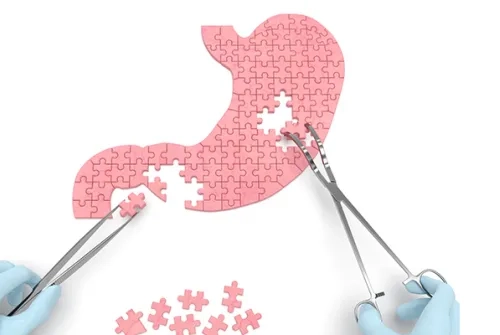Alo Yeditepe
Alo Yeditepe
Are Obesity Surgeries Risky?
Obesity surgeries are major surgical procedures and as with any procedure, these surgeries have some risks. However, nowadays, obesity surgeries are performed with high success rates. The closed method is the standard for obesity surgeries, and the postoperative risks have decreased with the advancement of technical possibilities.
The most important problems that may be encountered after the operation are leakage at the suture line, bleeding, and pulmonary embolism. Pulmonary embolism is the movement of the clot formed in the veins of the legs to block the vessels in the lungs. It can be life-threatening. In order to reduce this risk, measures such as ensuring the movement of the patient as early as possible, using anticoagulant medications, and putting on pressure-generating stockings are taken. Leakages are now rare and cause vital problems that require early diagnosis and treatment. In this case, sometimes endoscopic procedures and sometimes surgeries may be required. Bleeding is still a problem that we can control, and rarely, reoperation may be required for bleeding control.
Considering all the risks, the risk of obesity and related diseases is higher than the risk of surgery.
How long is the recovery period, and when and how does the patient return to his/her daily life?
The patient stays in the hospital for about 2-3 days. He/she can walk and meet his/her own daily needs in the first day. On the first day after the surgery, a clear liquid diet is started. In the follow-up of the dietitian, a nutrition program is organized, which is determined according to the weeks, from liquids to purees and then to solid foods.
Vitamin and mineral supplements are started in the early period because the absorption of these substances we need decreases in all types of surgery. Protein support for the first four months is given to prevent the loss of muscle mass of the patient.
At the end of the first week, the patient returns to his/her daily life. He/she can do light walking activities. At the end of the first month, he/she can start activities such as aerobics and swimming. After 2 months, there is no harm in doing resistance exercises that require more effort. Of course, we find it right to act according to the recommendations of the specialists in this regard.
Is The Weight Lost with Obesity Surgery Can Be Gained Back?
Surgery will open a new chapter in the lives of patients, but maintaining it is the key to success. It is easier to do this than before the surgery, it should be stated.
What Should Be Done Not to Gain Weight After Obesity Surgery?
In order for obesity surgery to be successful, patients must accept the lifestyle changes they will make after the surgery from the beginning. Because in order to reach the targeted weight, the patient should not go back to his/her former life. In addition, it should not be forgotten that some responsibilities fall on the patient. Nutrition and physical activity are the most important issues that patients should pay attention to after obesity surgery. On the one hand, we expect patients to comply with nutrition programs under the control of specialized dietitians, and on the other hand, to make physical activity a part of their lives. Sleep patterns and healthy social life will also help in maintaining success.
Will There Be an Incision Scar After Obesity Surgery?
Since the surgeries are performed with the laparoscopic method, approximately 0.5 – 1 cm long incisio
This content was prepared by Yeditepe University Hospitals Medical Editorial Board.
”
See Also
- What is Laparoscopic Reflux Surgery and How is it Performed?
- Revision Surgery in Obesity Surgeons
- What is Gallbladder Surgery?
- Patched Solution for Umbilical Hernia
- Swallowable Gastric Balloon
- What Are the Symptoms of Gallbladder Stones? How Is It Treated?
- 3 Major Developments Shaping Treatment in Colon Cancer
- Can Weight Loss Despite Not Dieting Be a Sign of Cancer?
- He Came to Turkey to Get Rid of the Colostomy Bag
- Emotional Stress May Affect Risk of Recurrence in Breast Cancer
- Although Her Fears Prevented Her from Going to the Hospital, She Managed to Beat Breast Cancer at the Age of 70
- Breast Cancer Screening Applications Decreased by 10% Before the Pandemic
- Facts About Breast Cancer
- Liver Cancer (Tumor) and Treatment
- Gallbladder Stones
- What Is Appendicitis?
- Questions About Gastroenterology Surgery
- What are the Types of Obesity Surgeries?
- Questions About Obesity Surgery
- A New Era in Obesity Surgery
- Overweight
Alo Yeditepe




